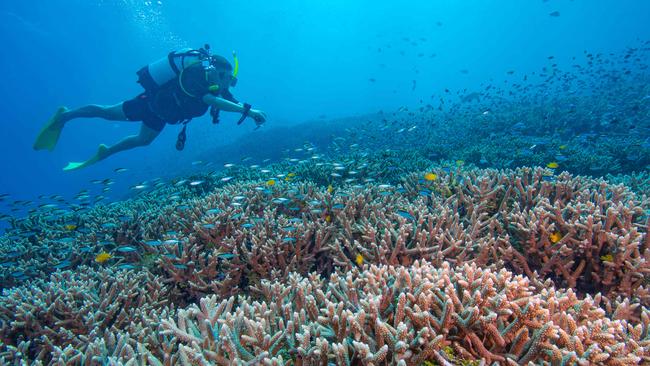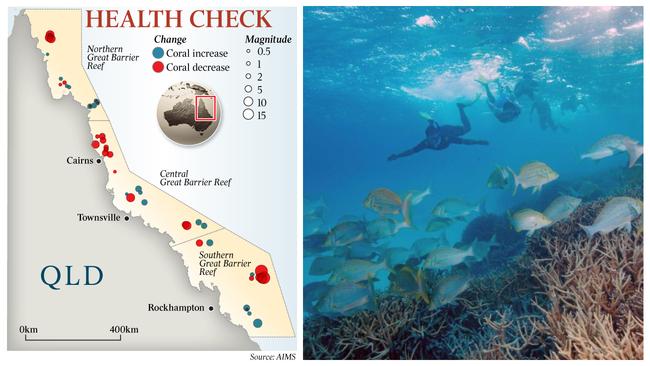Resilient Great Barrier Reef facing ‘unprecedented challenges’
Coral cover on the northern Barrier Reef shows signs of recovery but the outlook overall is mixed, says a new survey.

Coral cover on the northern Great Barrier Reef was showing signs of recovery after back-to-back bleaching events but the outlook overall is mixed, according to the latest long-term survey of reef health.
The Australian Institute of Marine Science has again sounded the alarm on potential limits to reef resilience in its 2019 report.
But it says early indications from detailed surveys show that “coral juveniles across the Great Barrier Reef occurred at densities favourable for recovery in the absence of further disturbances”.
Program leader Mike Emslie said this year’s report showed hard coral cover continued to decline in the central and southern Great Barrier Reef, while the northern region had stabilised.
AIMS chief executive Paul Hardisty said the Great Barrier Reef “is still beautiful and it is resilient, but it is facing unprecedented challenges”.
WWF Australia head of oceans Richard Leck said the report showed “Australia must urgently reduce its dependency on fossil fuels and rapidly speed up the transition to a renewable economy”.
Former James Cook University professor Peter Ridd said the report confirmed that “the pulse of the GBR is looking fine”.
“Overall cover is around average with strong recovery after the northern bleaching and still lots of naturally hungry starfish grazing on the coral like they always did,” Dr Ridd said.
For the first time the AIMS survey report does not give a snapshot of average coral cover across the whole reef.

But it says average hard coral cover continued to decline in the central and southern Great Barrier Reef while stabilising in the northern region this year.
Mean coral cover in the southern Great Barrier Reef is down from 25 per cent last year to 24 per cent this year, the central Great Barrier Reef is down from 14 per cent to 12 per cent, and in the northern Great Barrier Reef it increased from the record low of 11 per cent in 2017 to 14 per cent this year.
The AIMS report said while hard coral cover had increased slightly in the northern region it remained close to the lowest levels recorded since 1985. “This reflects the cumulative impacts of cyclones and two episodes of severe coral bleaching over the period 2014 to 2019,” the survey said.
Researchers said they did not find reef degradation from the 2016 and 2017 bleaching events to be as widespread as previously reported. But they said surveys in the northern Great Barrier Reef this year may over-estimate hard coral cover because coral bleaching in 2016 caused the greatest mortality on onshore reefs, but few inshore reefs could be surveyed due to safety concerns.
The surveys recorded many juvenile corals at densities that are expected to promote future recovery. For full recovery, researchers predict that severely impacted reefs will require decades without recurrent disturbances.
Reefs in the central Great Barrier Reef had sustained significant coral loss due to Severe Tropical Cyclone Debbie in 2017 and due to the continued southward spread of crown-of-thorns starfish.
The AIMS report says the Great Barrier Reef has been subjected to intense disturbances in the past five years.
“A fourth wave of crown-of-thorns starfish, coupled with a cluster of severe tropical cyclones and major bleaching events have caused widespread coral declines on a spatial scale which is unparalleled in the history of LTMP surveys,” the survey said.



